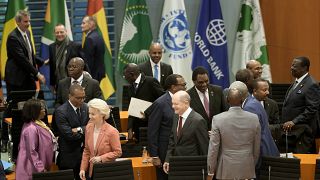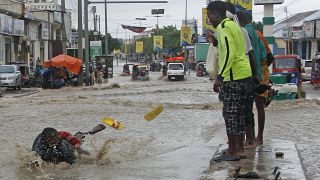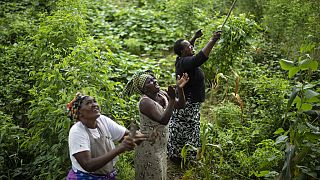Ivory Coast
Supplying around 40% of the world's cocoa, the Ivory Coast is the leading producer. But after exceptionally heavy rains this year, the country's cocoa warehouses are almost empty with producers expecting a harvest of between 3 to 4 times smaller than last year.
The west African country relies heavily on its cocoa production, with a fifth of the Ivorian population reliant on cocoa for their income.
With the harvest devastated by the higher than average rainfall, many families will see a loss of income.
Unusual rainfall
In the Ivory Coast's south, July was especially wet. The country's meteorological agency Sodexam reported precipitation in some areas that was between 20 to 40% higher than the average in the years between 1991 to 2020.
For cocoa plants, this heavy rainfall was extremely destructive.
Cocoa requires a careful balance between sun and rain, requiring a little of both but not too much.
The extreme rainfall in July destroyed the flowers on many cocoa plants and, thus, the harvest.
Global output
In anticipation of the poor crop, the country suspended cocoa exports in July, pushing prices of the prized bean to record highs.
In London, the price of a tonne of cocoa peaked on 10 November at £3,478, the highest since 1989, while in New York it topped the $4,000 mark, the highest level since the end of 1978, i.e. 45 years ago.
An end to the rainfall will not necessarily mean an end to the crisis.
With the El Nino climate phenomenon threatening periods of drought in west Africa, the situation will remain critical.
"This is proof that climate change is hitting developing countries hardest," says Ivorian economist Séraphin Prao.
Loss of income
It is a worrying scenario for producers.
The government, which fixes the cocoa price, has raised prices this year but the diminished harvest means that income loss is inevitable for Ivorian producers.
Prao argues that a free-market system would allow farmers to benefit from the current context.
"In Cameroon, for example, where the price is not set by the state, a kilo of cocoa sells for twice as much," he says.













01:44
Agriculture fair opens in drought-hit Morocco with focus on sustainability
11:08
Can Africa’s soil sustain food security? [Business Africa]
01:11
Kenya floods: Nairobi residents grapple with aftermath
Go to video
Climate change is bringing malaria to new areas
02:18
Plastic pollution: global treaty talks underway in Canadian capital
01:34
Brazil: Indigenous people gather for week-long protest in Brasilia